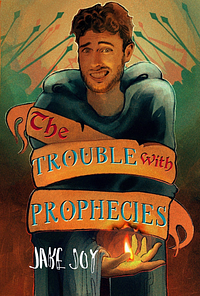Take a photo of a barcode or cover
5% in: I have a hard time with humorous stories because most of them aren't funny to me. We'll see how far I get with this on sale one.
7% is the answer. DNF, because the prose is too wordy for any humor to work, the wizard's supposed to be ancient but I can't see it, and while I like the warrior, it's not enough to continue the trudge.
7% is the answer. DNF, because the prose is too wordy for any humor to work, the wizard's supposed to be ancient but I can't see it, and while I like the warrior, it's not enough to continue the trudge.
adventurous
emotional
funny
hopeful
lighthearted
reflective
medium-paced
Plot or Character Driven:
A mix
Strong character development:
Yes
Loveable characters:
Yes
Diverse cast of characters:
Yes
Flaws of characters a main focus:
Yes
I got firsties !
I listen to a lot of audiobooks during my stupid commute. Sure it’s convenient. Yet sometimes I feel I’m missing out on some good stories not available in that format. I’m trying to fix that by seeking out new authors in the text-only realm.
Good thing. Otherwise, I would’ve missed The Trouble with Prophecies.
*** No spoilers ahead ***
The plot hits the ground sprinting. A lot of Fantasy novels front-load the narrative with backstory and world-building. Yet you’ll find no infodumping here. Most things are explained in dialogue. The exposition feels just right.
We are introduced to the two main characters in the first chapter...
Derrick is a 400-year-old wizard in a 35-year-old body. He’s a master of spells and insults. He’s not evil, just indifferent. Derrick’s also a colossal pain in the ass.
Kelthi is a seven-foot barbarian on a mission to defeat the evil Monarch. Unfortunately, she needs Derrick’s help to do it. She’s not simple-minded, merely single-minded. This battle maiden has a job to do. Woe is the person who gets in her way - Derrick included.
From here, we follow Derrick and Kelthi on an epic journey. They meet an array of colorful characters along the way. Some join their quest. Each has something to say and a unique voice to say it. The dialogue is engaging and believable.
The characters sometimes speak in a way that’s over the top or on the nose. This is by design. The author is clearly taking the piss on the Fantasy genre. Thankfully, he knows when to put the Joker back into the deck.
Even so, the narrative and characters are more often breaking tropes than rolling with them. Sometimes the author is subtle, othertimes not. Yet the reader is always in on the gag. We get it - and the author trusts us to get it.
There is sadness among the humor. People are hurt. People die. There is serious and sometimes heartbreaking introspection from the main characters. Painful secrets lead to even more painful revelations. A few scenes brought me to tears.
Both dialogue and narrative also tackle modern social issues with a combination of feathers and sledgehammers. The sledgehammer bits are often delivered with a dose of irony. The prose is very self-aware, and doesn’t insult the reader. I wish more modern fiction was like this.
Despite its moral compass, The Trouble with Prophecies isn’t a morality play. It’s a story - a damned good one. 350 pages is enough for the world of Feydern and its inhabitants to spread out, and pull you in.
The ending is as enjoyable as the journey.
If you like the Discworld series, buy this. If you never heard of Discworld, Buy This. If you dig the Fantasy genre, BUY THIS. If you hate Fantasy, BuY tHiS !
The author suggests an age range of 14 to 18 years. However, I feel this unfairly precludes Prophecies from a wider audience. There is something for just about everyone here.
That’s the trouble with prophecies. Even when you don’t care about them, they still care about you.
I listen to a lot of audiobooks during my stupid commute. Sure it’s convenient. Yet sometimes I feel I’m missing out on some good stories not available in that format. I’m trying to fix that by seeking out new authors in the text-only realm.
Good thing. Otherwise, I would’ve missed The Trouble with Prophecies.
*** No spoilers ahead ***
The plot hits the ground sprinting. A lot of Fantasy novels front-load the narrative with backstory and world-building. Yet you’ll find no infodumping here. Most things are explained in dialogue. The exposition feels just right.
We are introduced to the two main characters in the first chapter...
Derrick is a 400-year-old wizard in a 35-year-old body. He’s a master of spells and insults. He’s not evil, just indifferent. Derrick’s also a colossal pain in the ass.
Kelthi is a seven-foot barbarian on a mission to defeat the evil Monarch. Unfortunately, she needs Derrick’s help to do it. She’s not simple-minded, merely single-minded. This battle maiden has a job to do. Woe is the person who gets in her way - Derrick included.
From here, we follow Derrick and Kelthi on an epic journey. They meet an array of colorful characters along the way. Some join their quest. Each has something to say and a unique voice to say it. The dialogue is engaging and believable.
The characters sometimes speak in a way that’s over the top or on the nose. This is by design. The author is clearly taking the piss on the Fantasy genre. Thankfully, he knows when to put the Joker back into the deck.
Even so, the narrative and characters are more often breaking tropes than rolling with them. Sometimes the author is subtle, othertimes not. Yet the reader is always in on the gag. We get it - and the author trusts us to get it.
There is sadness among the humor. People are hurt. People die. There is serious and sometimes heartbreaking introspection from the main characters. Painful secrets lead to even more painful revelations. A few scenes brought me to tears.
Both dialogue and narrative also tackle modern social issues with a combination of feathers and sledgehammers. The sledgehammer bits are often delivered with a dose of irony. The prose is very self-aware, and doesn’t insult the reader. I wish more modern fiction was like this.
Despite its moral compass, The Trouble with Prophecies isn’t a morality play. It’s a story - a damned good one. 350 pages is enough for the world of Feydern and its inhabitants to spread out, and pull you in.
The ending is as enjoyable as the journey.
If you like the Discworld series, buy this. If you never heard of Discworld, Buy This. If you dig the Fantasy genre, BUY THIS. If you hate Fantasy, BuY tHiS !
The author suggests an age range of 14 to 18 years. However, I feel this unfairly precludes Prophecies from a wider audience. There is something for just about everyone here.
That’s the trouble with prophecies. Even when you don’t care about them, they still care about you.


